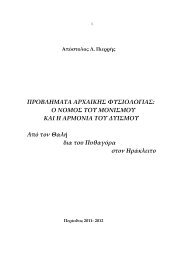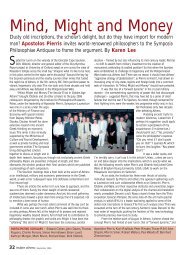chapter 10 the monism of darkness and the dualism of limit and ...
chapter 10 the monism of darkness and the dualism of limit and ...
chapter 10 the monism of darkness and the dualism of limit and ...
Create successful ePaper yourself
Turn your PDF publications into a flip-book with our unique Google optimized e-Paper software.
116 CHAPTER <strong>10</strong><br />
Iuppiter et primae velit omnia reddere massae.<br />
But this is not a particularly convincing addition. As we have analysed<br />
above, <strong>the</strong> revolution <strong>of</strong> <strong>the</strong> World distinguishes things, it does not confuse<br />
<strong>the</strong>m. That is why <strong>the</strong> emendation solvere has been suggested in v. 829. But<br />
<strong>the</strong> dissolution <strong>of</strong> some mass or heap (moles, massa) indicates distinction,<br />
not confusion, <strong>of</strong> parts; <strong>and</strong> this is how it is used, Ovid, Fasti I <strong>10</strong>6-8. It is<br />
<strong>the</strong> constitution <strong>of</strong> <strong>the</strong> World, not its mass, that is dissolved at <strong>the</strong> end <strong>of</strong><br />
Time. Cf. e.g. <strong>the</strong> already cited passage Lucanus, Bellum Civile I, 72-4. See<br />
also below Silius passage: compage soluta. And Claudianus, Raptus<br />
Prosperinae I, 115-6: compage soluta / fulgidus umbroso miscebitur axis<br />
Averno. Heaven as articulated hypostasis is dissolved in chaotic Tartarus,<br />
Virgil, Aeneis XII, 204: coelumque in Tartara solvat. In similar manner but<br />
more articulately Silius Italicus with <strong>the</strong> use <strong>of</strong> compages (compago = make<br />
compact, solidify), Punicorum XVII, 606-7: Caelum licet omne soluta / in<br />
caput hoc compage ruat. Heaven falls when <strong>the</strong> entire constitution <strong>of</strong> <strong>the</strong><br />
World is dissolved. Prudentius, Ca<strong>the</strong>merinon XI, <strong>10</strong>7-8: Et scissus axis<br />
cardinem / Mundi ruentis solverit. (The World’s axis is broken <strong>and</strong> <strong>the</strong><br />
polar seat <strong>and</strong> cardinal base <strong>of</strong> its revolution is dissolved). His formulation<br />
in Hamartigenia 505-6 is looser: ex elementis / cuncta solubilibus fluxoque<br />
creamine constant: <strong>the</strong> elements <strong>and</strong> parts <strong>of</strong> <strong>the</strong> World are dissolved as <strong>the</strong><br />
entire creature is fundamentally fluid <strong>and</strong> in flux. In <strong>the</strong> exact use <strong>of</strong> <strong>the</strong><br />
idea what is always expressed is <strong>the</strong> dissolution <strong>of</strong> an articulated whole or<br />
syn<strong>the</strong>sis, <strong>of</strong> <strong>the</strong> cosmic ordered system. Seneca, Epistulae Morales IX, 16:<br />
Qualis est Jovis, cum resoluto mundo et diis in unum confusis paulisper<br />
cessante natura adquiescit sibi cogitationibus suis traditus. He refers to <strong>the</strong><br />
Stoic conflagration at <strong>the</strong> end <strong>of</strong> Time when Zeus dissolves <strong>and</strong> reduces<br />
everything into himself. This is described in more detail in De Beneficiis<br />
VI, 22, where <strong>the</strong> parts <strong>of</strong> <strong>the</strong> world are said to be released from <strong>the</strong> present<br />
World-Order <strong>and</strong> to merge into an indiscriminate mass: ex tanta varietate<br />
solvantur, atque eant in unum omnia. Manilius (Burman had already<br />
compared this passage) uses <strong>the</strong> same expression (as <strong>the</strong> suggested solvere<br />
molem for our Flaccean passage) Asronomicon I, 718, in <strong>the</strong> first<br />
explanation <strong>of</strong> <strong>the</strong> Milky Way that he <strong>of</strong>fers (namely that it represents <strong>the</strong><br />
beginning for Sky’s split into two halves):<br />
num se diductis conetur solvere moles<br />
segminibus, raraque labent compagine rimae<br />
admonitantque novum laxato tegmine lumen.










